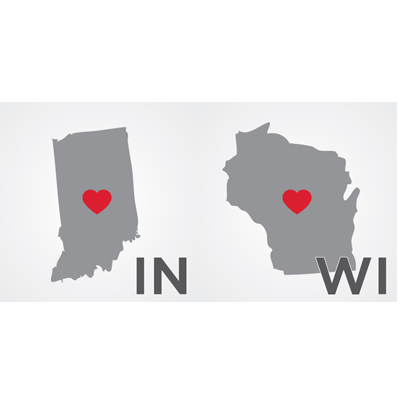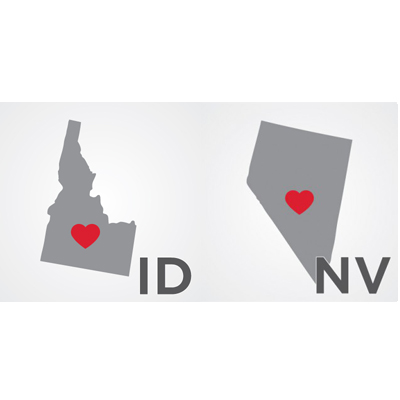(Updated November 19, 2014)

Since the United States Supreme CourtŌĆÖs decisions in┬ĀPerry┬Āand┬ĀWindsor┬Āin June 2013, fifty-four┬Āpro-equality court orders have been issued from coast to coast.
Those opinions have been made in the last fourteen months, at least one per month, and each continuing the momentum toward federal marriage equality.
 August 26, 2013: New Mexico
August 26, 2013: New Mexico
Griego v. Oliver
New MexicoŌĆÖs marriage ban is unconstitutional.┬Ā┬Ā
┬ĀŌĆ£For the reasons set forthŌĆ”the operative facts being undisputed, Plaintiffs have demonstrated a significant likelihood of success on the merits of their claim.ŌĆØ
 September 27, 2013: New Jersey
September 27, 2013: New Jersey
Garden State Equality v. Dow
New JerseyŌĆÖs marriage ban is unconstitutional.
┬ĀŌĆ£Same-sex couples must be allowed to marry in order to obtain equal protection of the law under the New Jersey Constitution.ŌĆØ ┬Ā ┬Ā ┬Ā ┬Ā┬Ā
 October 18, 2013: New Jersey
October 18, 2013: New Jersey
Garden State Equality v. Dow
Affirms New JerseyŌĆÖs marriage ban is unconstitutional.
┬ĀŌĆ£We conclude that the State has not made the necessary showing to prevail on any of the Crowe factors and that the public interest does not favor a stay.ŌĆØ
 November 25, 2013: Illinois
November 25, 2013: Illinois
Gray v. Orr
Illinois must grant marriage license to one plaintiff couple.
ŌĆ£Defendant is ordered to register their solemnized marriage as is presently required for all other marriages.ŌĆØ
 December 19, 2013: New Mexico
December 19, 2013: New Mexico
Griego v. Oliver
Affirms New MexicoŌĆÖs marriage ban is unconstitutional.
ŌĆ£We conclude that the purpose of New Mexico marriage laws is to bring stability and order to the legal relationship of committed couples by defining their rights and responsibilities as to one another, their children if they choose to raise children together, and their property. Prohibiting same-gender marriages is not substantially related to the governmental interests advanced by the parties opposing same-gender marriage or to the purposes we have identified.ŌĆØ
 December 20, 2013: Utah
December 20, 2013: Utah
Kitchen v. Herbert
UtahŌĆÖs marriage ban is unconstitutional.
ŌĆ£The StateŌĆÖs current laws deny its gay and lesbian citizens their fundamental right to marry and, in so doing, demean the dignity of these same-sex couples for no rational reason. Accordingly, the court finds that these laws are unconstitutional.ŌĆØ
 December 23, 2013: Ohio
December 23, 2013: Ohio
Obergefell v. Wymyslo
Ohio must recognize lawful marriages on death certificates.
ŌĆ£ŌĆ”Once you get married lawfully in one state, another state cannot summarily take your marriage away, because the right to remain married is properly recognized as a fundamental liberty interest protected by the Due Process Clause of the United States Constitution.ŌĆØ
 January 14, 2014: Oklahoma
January 14, 2014: Oklahoma
Bishop v. US
OklahomaŌĆÖs marriage ban is unconstitutional.
ŌĆ£Equal protection is at the very heart of our legal system and central to our consent to be governed. It is not a scarce commodity to be meted out begrudgingly or in short portions. Therefore, the majority view in Oklahoma must give way to individual constitutional rights.ŌĆØ
 February 13, 2014: Kentucky
February 13, 2014: Kentucky
Bourke v. Beshear
Kentucky must recognize lawful marriages.
ŌĆ£What this opinion doesŌĆ”is make real the promise of equal protection under the law. It will profoundly affect validly married same-sex couplesŌĆÖ experience of living in the Commonwealth and elevate their marriage to an equal status in the eyes of state law.ŌĆØ
 February 13, 2014: Virginia
February 13, 2014: Virginia
Bostic v. Rainey
VirginiaŌĆÖs marriage ban is unconstitutional.
ŌĆ£We have arrived upon another moment in history when We the People becomes more inclusive, and our freedom more perfect.ŌĆØ
 February 16, 2014: Texas
February 16, 2014: Texas
DeLeon v. Perry
TexasŌĆÖ marriage ban is unconstitutional.
ŌĆ£Equal treatment of all individuals under the law is not merely an aspiration ŌĆō it is a constitutional mandate.ŌĆØ
 February 21, 2014: Illinois
February 21, 2014: Illinois
Lee v. Orr
Cook County, Illinois, must issue marriage licenses immediately.
ŌĆ£There is no reason to delay further when no opposition has been presented to this court and committed gay and lesbian couples have already suffered from the denial of their fundamental right to marry.ŌĆØ
 March 14, 2014: Tennessee
March 14, 2014: Tennessee
Tanco v. Haslam
Tennessee must recognize the lawful marriages of three couples.
ŌĆ£The stateŌĆÖs refusal to recognize the plaintiffsŌĆÖ marriages de-legitimizes their relationships, degrades them in their interactions with the state, causes them to suffer public indignity, and invites public and private discrimination and stigmatization.ŌĆØ
 March 21, 2014: Michigan
March 21, 2014: Michigan
DeBoer v. Snyder
MichiganŌĆÖs marriage ban is unconstitutional.
ŌĆ£TodayŌĆÖs decisionŌĆ”affirms the enduring principle that regardless of whoever finds favor in the eyes of the most recent majority, the guarantee of equal protection must prevail.ŌĆØ
 April 14, 2014: Ohio
April 14, 2014: Ohio
Henry v. Himes
Ohio must recognize lawful marriages.
ŌĆ£The fact that a form of discrimination has been ŌĆ£traditionalŌĆØ is a reason to be more skeptical of its rationality and cause for courts to be especially vigilant.ŌĆØ
 April 18, 2014: Indiana
April 18, 2014: Indiana
Baskin v. Bogan
Indiana must recognize the lawful marriage of one couple.
ŌĆ£The court finds Plaintiffs suffer a cognizable and irreparable harm stemming from the violation of their constitutional rights of due process and equal protection.ŌĆØ
 April 23, 2014: Texas
April 23, 2014: Texas
ALFL v. KLL
TexasŌĆÖ marriage ban is unconstitutional.
ŌĆ£The best interest of the child is always the primary consideration of the court. By denying their parents the right to marry, Texas has created a suspect classification of children who are denied equal protection of the law under the 14th Amendment.ŌĆØ
 May 9, 2014: Arkansas
May 9, 2014: Arkansas
Wright v. Arkansas
ArkansasŌĆÖ marriage ban is unconstitutional.
ŌĆ£It has been over forty years since Mildred Loving was given the right to marry the person of her choice. The hatred and fears have long since vanished and she and her husband lived full lives together; so it will be for the same-sex couples. It is time to let that beacon of freedom shine brighter on all our brothers and sisters. We will be stronger for it.ŌĆØ
 May 13, 2014: Idaho
May 13, 2014: Idaho
Latta v. Otter
IdahoŌĆÖs marriage ban is unconstitutional.
ŌĆ£Slow as the march toward equality may seem, it is never in vain.ŌĆØ
 May 19, 2014: Oregon
May 19, 2014: Oregon
Geiger v. Kitzhaber
OregonŌĆÖs marriage ban is unconstitutional.
ŌĆ£Let us look less to the sky to see what might fall; rather, let us look to each otherŌĆ”and rise.ŌĆØ
 May 19, 2014: Utah
May 19, 2014: Utah
Evans v. Utah
Utah must recognize 1,300 marriages performed in the state.
“Attorney General Sean Reyes shall immediately recognize the marriages by same-sex couples┬Āentered pursuant to Utah marriage licenses issued and solemnized between December 20, 2013,┬Āand January 6, 2014, and afford these same-sex marriages all the protections, benefits, and┬Āresponsibilities given to all marriages under Utah law.”
 May 20, 2014: Pennsylvania
May 20, 2014: Pennsylvania
Whitewood v. Wolf
PennsylvaniaŌĆÖs marriage ban is unconstitutional.
ŌĆ£In the sixty years since Brown was decided, ŌĆśseparateŌĆÖ has thankfully faded into history, an only ŌĆśequalŌĆÖ remains. Similarly, in future generations the label same-sex marriage will be abandoned, to be replaced simply by marriage.ŌĆØ
 June 6, 2014: Wisconsin
June 6, 2014: Wisconsin
Wolf v. Walker
WisconsinŌĆÖs marriage ban is unconstitutional.
ŌĆ£Quite simply, this case is about liberty and equality, the two cornerstones of the rights protected by the United States Constitution.ŌĆØ
 June 25, 2014: Indiana
June 25, 2014: Indiana
Baskin, Lee, Fujii
Indiana’s marriage ban is unconstitutional.
ŌĆ£It is clear that the fundamental right to marry shall not be deprived to some individuals based solely on the person they choose to love. In time, Americans will look at the marriage of couples such as Plaintiffs, and refer to it simply as a marriage ŌĆō not a same- sex marriage.”
 June 25, 2014: Utah
June 25, 2014: Utah
Kitchen v. Herbert
10th Circuit affirms Utah’s marriage ban is unconstitutional.
ŌĆ£Our commitment as Americans to the principles of liberty, due process of law, and equal protection of the laws is made live by our adherence to the Constitution of the United States of America.”
 July 1, 2014
July 1, 2014
Baskin v. Bogan
7th Circuit affirms Indiana must recognize the lawful marriage of one couple.
“The appellants are ordered to recognize the validity of the 2013 marriage between appellees Amy Sandler and Nikole Quasney.”┬Ā
 July 1, 2014: Kentucky
July 1, 2014: Kentucky
Love v. Beshear
Kentucky’s marriage ban is unconstitutional.
“Assuring equal protection for same-sex couples does not diminish the freedom of others to any degree.┬ĀHopefully, even those opposed to or uncertain about same-sex marriage will see it that way in the future.”
 July 9, 2014: Colorado
July 9, 2014: Colorado
Brinkman v. Long
Colorado’s marriage ban is unconstitutional.
“If civil unions were somehow the equivalent of marriage, there would be no real need for this second tier relationship.”
 July 17, 2014: Florida
July 17, 2014: Florida
Huntsman v. Heavilin
Florida’s marriage ban is unconstitutional.
“The right these plaintiffs seek is not a new right, but is a right that these individuals have always been guaranteed by the United States Constitution.”┬Ā
 July 18, 2014: Oklahoma
July 18, 2014: Oklahoma
Bishop v. Smith
10th Circuit affirms Oklahoma’s marriage ban is unconstitutional.
“State bans on the licensing of same-sex marriage significantly burden the fundamental right to marry.”
 July 23, 2014: Colorado
July 23, 2014: Colorado
Burns v. Hickenlooper
Colorado’s marriage ban is unconstitutional.
┬Ā”Plaintiffs have made a strong showing of a substantial likelihood of success on the merits of their claims.”
 July 25, 2014: Florida
July 25, 2014: Florida
Pareto v. Ruvin
Florida’s marriage ban is unconstitutional.
“It is our country’s proud history to protect the rights of the individual, the rights of the unpopular and the rights of the powerless.”
 July 28, 2014: Virginia
July 28, 2014: Virginia
Bostic v. Schaefer
4th Circuit affirms Utah’s marriage ban is unconstitutional.
“We recognize that same-sex marriage makes some people deeply uncomfortable. However, inertia and apprehension are not legitimate bases for denying same-sex couples due process and equal protection of the laws.”
 August 5, 2014: Florida
August 5, 2014: Florida
In Re: Estate of Bangor
Florida’s marriage ban is unconstitutional.
“Same-sex couples are entitled to respect, dignity, and protection as any other spouse…”
 August 19, 2014: Indiana
August 19, 2014: Indiana
Bowling v. Pence
Indiana must recognize lawful marriages
“The phenomenon that the court previously observed has continued to grow. Since issuing its prior orders, two circuit courts have found bans similar to IndianaŌĆÖs to be unconstitutional. This court reaffirms that conclusion today.”
 August 21, 2014: Florida
August 21, 2014: Florida
Brenner v. Scott
Florida’s marriage ban is unconstitutional.
“The founders of this nation said in the preamble to the United States Constitution that a goal was to secure the blessings of liberty to themselves and their posterity.”
 September 3, 2014: Wisconsin & Indiana
September 3, 2014: Wisconsin & Indiana
Baskin v. Bogan; Wolf v. Walker
7th Circuit affirms Wisconsin’s and Indiana’s marriage bans are unconstitutional.
“Formally these cases are about discrimination against the small homosexual minority in the United States. But at a deeper level…they are about the welfare of American children.”
 September 11, 2014: Indiana
September 11, 2014: Indiana
Romero v. Brown
Indiana must recognize lawful marriage of one┬Āplaintiff-couple.
“…the concept of marriage in the western civilization as permanent, exclusive, and monogamous union between a man and a woman has once again been redefined by some states in the Union to include persons of the same sex. While those states are still the minority, they are a fast growing minority, aided by almost unanimous court rulings in many of the majority states that marriage must necessarily include persons of the same sex not to be discriminatory.”
 September 12, 2014: Arizona
September 12, 2014: Arizona
Majors v. Jeanes
Arizona must recognize lawful marriage of one plaintiff-couple.
┬Ā”…defendants argue Arizona’s man/woman marriage laws were not intended to discriminate against same-sex couples. Accepting that is true, it does not alter the fact that the laws do not discriminate.”
 September 22, 2014: Louisiana
September 22, 2014: Louisiana
In Re Costanza and Brewer
Louisiana’s marriage ban is unconstitutional.
Louisiana’s marriage laws are “arbitrary, capricious, discriminatory, and unrelated to any legitimate state interest.”
 October 3, 2014: Missouri
October 3, 2014: Missouri
Barrier v. Vasterling
Missouri must recognize lawful marriages.
“While having a standardized definition of marriage that promotes ‘consistency, uniformity, and predictability’ may be a legitimate governmental interest, there is no logical relationship between that interest and laws that discriminate against gay men and lesbians who have been married…”
 October 7, 2014: Idaho & Nevada
October 7, 2014: Idaho & Nevada
Latta v. Otter; Sevcik v. Sandoval
9th Circuit strikes down Idaho’s and Nevada’s marriage bans.
“The lessons of our constitutional history are clear: inclusion strengthens, rather than weakens, our most important institutions.”
 October 10, 2014: North Carolina
October 10, 2014: North Carolina
United Church of Christ v. Cooper
North Carolina’s marriage ban is unconstitutional.
“The issue before this court is neither a political issue nor a moral issue. It is a legal issue and it is clear as a matter of what is now settled law in the Fourth Circuit that North Carolina laws prohibiting same sex marriage, refusing to recognize same sex marriages originating elsewhere, and/or threatening to penalize those who would solemnize such marriages, are unconstitutional.”
 October 12, 2014: Alaska
October 12, 2014: Alaska
Hamby v. Parnell
Alaska’s marriage ban is unconstitutional.
“Refusing the rights and responsibilities afforded by legal marriage sends the public a government-sponsored message that same-sex couples and their familial relationships do not warrant the status, benefits, and dignity given to couples of the opposite sex.”
 October 14, 2014: North Carolina
October 14, 2014: North Carolina
Fisher-Borne v. Smith, Gerber v. Cooper
North Carolina’s marriage ban is unconstitutional.
“As stated by all parties, including the State of North Carolina, this court finds no substantive distinction between the North Carolina statutes and constitutional amendment and the statutory and constitutional provisions addressed in Bostic v. Schaefer.”
 October 17, 2014: Arizona
October 17, 2014: Arizona
Connolly v. Jeanes
Arizona’s marriage ban is unconstitutional.
“It is clear, however, that an appeal to the Ninth Circuit would be futile.”
 October 17, 2014: Arizona
October 17, 2014: Arizona
Majors v. Horne
Arizona’s marriage ban is unconstitutional.
“It is also clear…that the High Court will turn a deaf ear on any request for relief from the Ninth Circuit’s decision.”
 October 17, 2014: Wyoming
October 17, 2014: Wyoming
Guzzo v. Mead
Wyoming’s marriage ban is unconstitutional.
“Preventing the violation of a party’s constitutional rights is always in the public interest.”
 November 4, 2014: Kansas
November 4, 2014: Kansas
Marie v. Moser
Kansas’┬Ā┬Āmarriage ban is unconstitutional.
“Defendants may not refuse to issue marriage licenses on the basis that applicants are members of the same sex.”
 November 5, 2014: Missouri
November 5, 2014: Missouri
Missouri v. Florida
Missouri’s marriage ban is unconstitutional.
“The Court recognizes that the freedom to marry is a fundamental right and liberty deeply rooted in the history of the United States.”

“The StateŌĆÖs laws directly violate the due process and equal protection rights of same-sex couples.”
“It should not be forgotten that the Constitution is also an expression of the peopleŌĆÖs will. Indeed, it is the paramount expression of the peopleŌĆÖs will; it cannot easily be cast aside or circumvented by a vote of the citizens of a single state.”
 November 12, 2014: South Carolina
November 12, 2014: South CarolinaCondon v. Haley
South Carolina’s marriage ban is unconstitutional.
“It is well settled that any deprivation of constitutional rights “for even minimal periods of time” constitutes irreparable injury.”
“No family wants to deprive its precious children of the chance to marry the loves of their lives.”

 November 19, 2014: Montana
November 19, 2014: Montana